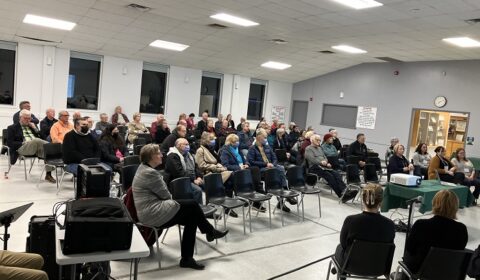NOT MUCH NEW INFORMATION ON HOSPITALS AS MAHC DEFENDS DECISION TO SPLIT SERVICES BLAMING PROVINCIAL FUNDING CUTS
Mark Clairmont | MuskokaTODAY.com
DWIGHT — Live by the scalpel, die by the scalpel.
That’s Muskoka’s hospitals.
After the province cut them some slack in agreeing to two hospitals, the Ministry of Health nipped and tucked their billion-dollar budget.
Two equal, full-service hospitals became “complimentary” last fall when COVID bludgeoned Muskoka Algonquin Healthcare’s $1.6-billion projected 2029-32 construction cost.
And thus gave birth to a ‘Made-in-Muskoka’ solution, as Queen’s Park put a tourniquet on the builds to staunch the budget bleeding.
In the end money and politics talked.
And the dream turned into a nightmare for some.
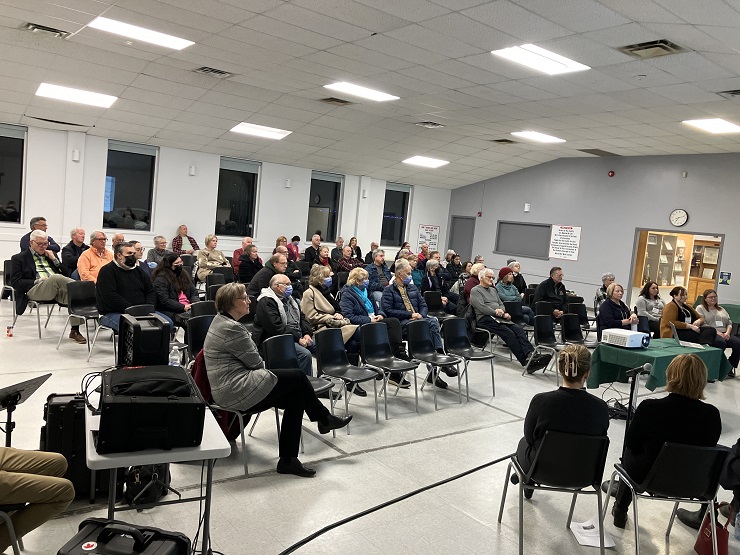
That’s the message MAHC took on a week-long road trip last night to sell South Muskoka District Hospital and Huntsville District Memorial Hospital as “equals.”
“We’re not losing one thing,” president and CEO Cheryl Harrison told about 50 people — along with more than a dozen staff — at the community centre here.
“I can’t say that enough.”
Huntsville won’t be getting “a real hospital” at the expense of Bracebridge, as Neil Smellie characterized it, she said.
In fact, said MAHC board chair Moreen Miller, SMMH will be the “busier” of the two in the “innovative” new healthcare model that will de-emphasize beds in eight years when both are expected to open.
If the province approves this spring’s proposed submission.
Miller said many critics — including 41 doctors in south Muskoka who “endorsed” a letter in opposition — were operating under misinformation.
Until last night.
To a mostly sympathetic Huntsville-oriented audience in the district’s northeast community of Lake of Bays, Miller said the community “chat” offered the final picture after she said “rumours” of the plan were in parts exaggerated.
Though when challenged afterwards about advance information leaked she backed down, admitting many details widely circulated officially before including on MAHC’s own letterhead to staff that were shared and reported by MuskokaTODAY.com last week, were indeed the basis of facts.
A slide said both sites will have full-service ERs and acute care, but Huntsville will have “predominantly inpatient services” and south Muskoka “predominantly ambulatory service.”
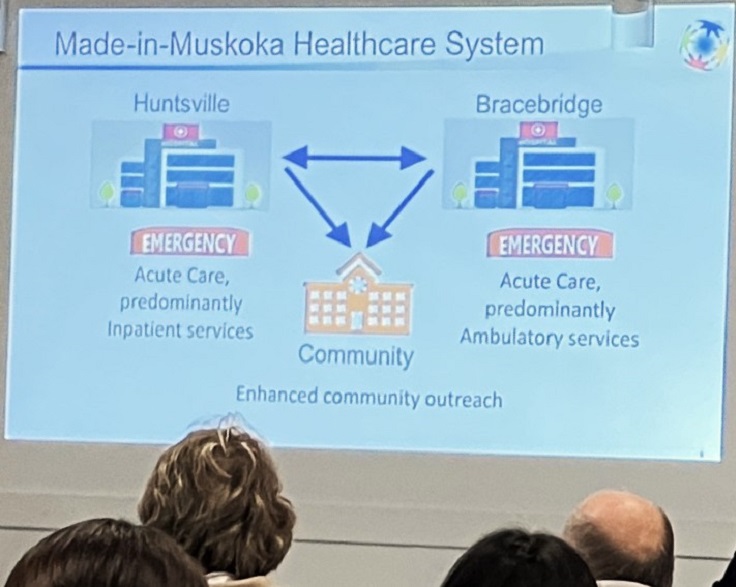
While a lot of numbers were shared, the crux of many concerns in south Muskoka revolve around the distribution of beds — at last count 139 in Huntsville and 18 in Bracebridge.
That means patients with complex care would go to Huntsville for longer stays and most day surgery would see patients go Bracebridge.
“Collectively, between the two sites we will have more beds and more services,” chief of staff Dr. Khaled Abdel-Razek said later.
Going before the public was MAHC’s first opportunity to pitch a reworked model of the past two to three months that is about “90 per cent” complete.
Abdel-Razek added after that long-term there remains room and a willingness of the board to address all concerns — including those of doctors — as MAHC tweaks its submission, something it did as late as this past weekend.
He said some of the doctors’ concerns aren’t based on 100 per cent “need to be addressed with more planning. But some of the concerns aren’t based 100 per cent on factual information of this new model.
“The two hospitals will not be the same. I think the perspective that is related in the letter is more of ‘this is not what we’re used to.’”
Abdel-Razek said “what we have currently is an inordinate number of patient beds. We are no able to weigh care by the number of beds or by the square footage. But by the function. And with the sort of resources we are assigned by the government and our local chair we will build two hospitals. We cannot have them identical. They have to complement each other. And so the services will be different from one side versus the other. All the basic emergency services will be the same, but there has to be some modification in terms of what is the ability of one and what is the ability of the other.”
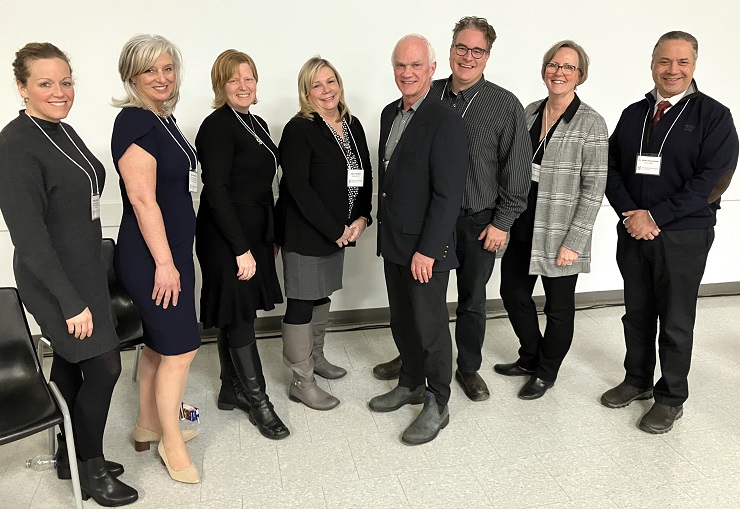
He said “geography plays a role in defining where some of the services needed to be.”
He cited the stroke recovery centre in Huntsville, which will bring about the new MRI in 2025 “to serve all of the patients of Muskoka.”
And as a result more Level 3 ICU beds will be needed with “Level 3” care — a step up from Level 2 now at both sites. That in turn will lead to 10 ICU beds in Huntsville and 4 at South Muskoka that will still be Level 2.
He said the “higher acuity ICU” helps in terms of geography as Huntsville services part of the North Bay catchments area and Barrie services closer to south Muskoka.
Which also counts for longer stay beds and rehabilitation or reactivation in Huntsville.
“To balance that we have more surgeries and ambulatory care or shorter stays at Bracebridge.
“That will not have an impact on our family medicine. It will not be affected or change.”
The chief of staff says there are “very few” general practitioners doctors “do that now, who come in to the hospital to see their patients.”
A fact disputed by doctors who say GPs need to have hospital privileges to work in Family Health Teams, says Dr. Stephen Whynot who wrote the letter endorsed by 40 others in south Muskoka.
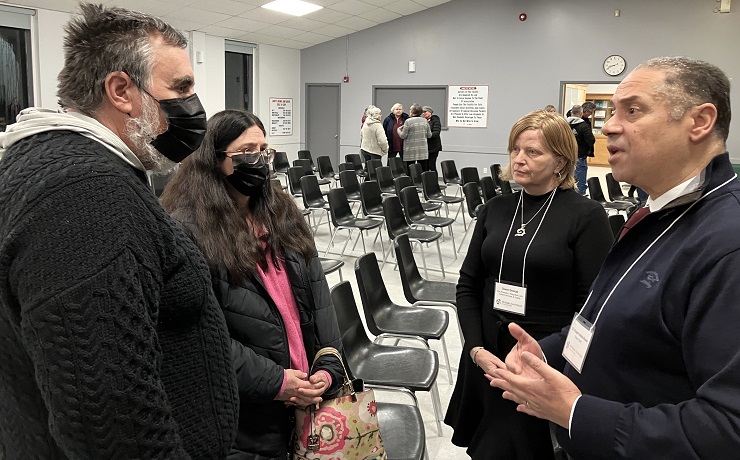
Abdel-Razek said “more of the model now is that we follow is where there would be one or two or three physicians at the hospital each caring for 15 to 20 patients.
“And that is becoming more of the standard across Ontario. And that is the model that is mostly happening now and will be even more established in the future. We will need more hospital physicians. And so we have hospital physicians in the hospital and community family practitioners in their offices.”
He said “there is nothing against” some of the GPs “being part of that on-call schedule for hospitals medicine.
“Alternatively there is nothing to say that every physician providing hospital services needs to have an office. So you can have a primary care office in the community or you can do hospital medicine or you can do both.”
Not every physician will have hospital privileges, he said, “but the majority will.”
Most ERs are staff by ER doctors only, even though some doctors do shifts in ER as well.
In terms of obstetrics — now at both sites — the focus will be in Huntsville, said Abdel-Razek.
But there will be provisions in Bracebridge for emergencies like caesareans. But if you’re six hours from delivery they will be referred to Huntsville.
“The details of that are still in the works.”
The population statistics for 2032 shows almost equivalent growth across Muskoka, he said, but the age category for women having babies will not grow that much.
At present it was said that two thirds of the 300 born in Muskoka are at Huntsville. And the ministry says growth projections, say 400 he said, means MAHC can only have so many labour and delivery rooms.
“So now on paper we have more labour and delivery rooms on paper than our number of deliveries would require as per ministry standards.”
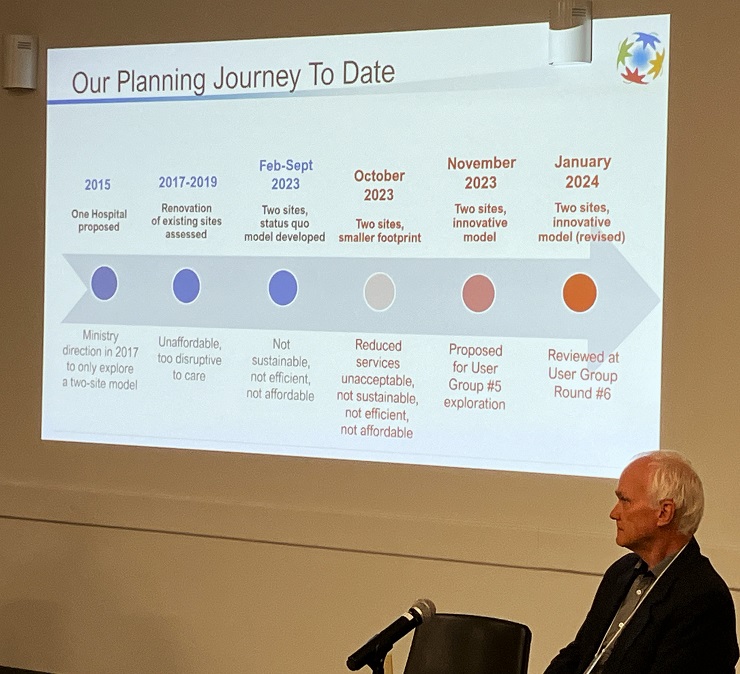
Another concern, added Abdel-Razek, is that “more of the growth is for people 55 years and older. So Muskoka will have a higher percentage of senior citizens from people moving north and the local population aging in place.
A question about ALC (alternate level of care) beds was brought up by Muskoka Lakes Councillor Guy Burry, noting people needing care can’t be returned to home or find long-term care facilities to reside in.
He said there needs to be solutions to finding new homes for them.
“It’s all great to build these new hospitals, but if we don’t have the tough love to run them why bother.”
Harrison said it’s not just a hospital issue but a system-wide system.
She said the province will no longer fund a rate of 30 per cent in hospitals.
“We will always have some ALC patients, but over my career I’ve seen it get down to 8 or 10 per cent. But you have to have pretty robust health-care system to make that happen.”
Along with a few comments of support, several expressed other concerns.
Doris MacDonald asked why existing hospitals couldn’t used and expanded.
She was told new building codes, notably to have single-patient rooms, upped the cost considerable.
When she cited older hospitals in Toronto, such as Sick Kids, she was told that older sections of those facilities weren’t used for medical purposes but administrative offices.
Another person asked about the number and quality of the jobs and whether they would be distributed equally in the communities.
Miller concluded on the evening saying “I think it was very positive. The audience asked excellent questions that told us that they have been thinking about the ways they want their hospitals to operate and they asked us questions to confirm or deny what they had heard or read. So I think people had a chance to understand it better.”
Miller understands community concerns.
She said many of the questions have already been heard and considered through “functional user groups” during the redevelopment process.
“But I’m pretty convinced that over the eight or 10 days that we’re going to hear something we might have missed. So we’re hoping to hear that.”
She said “the model changed comprehensively when we did a catch-up costing estimate in October 10.”

In 2019 “we submitted for two acute care hospitals almost identical to what we have here now. When it came back to us they said OK, you have to do some advance costing. And by the way things have changed dramatically in Ontario since COVID. So the number of single beds required in new hospital builds is significantly higher. The pandemic showed us that’s changed forever. The days of having 50 per cent shared rooms and 50 per cent private that’s done. So had to move through that. And construction costs have gone through the roof — everybody knows that. And Infrastructure Ontario and the Ministry of Health has seen these bills come in from across the province and the tenders are crazy expensive.
“So the province told us very clear — there is no more money. And we got our updated costing in October we said ‘Whoa! wait a minute we have to rethink this.’ But what it did was open up an opportunity, because if we were going to build two exact hospitals we have now, with two Level 2 ICUs, we would lose services. Because we wouldn’t be able to provide the same thing.”
Miller said “the idea came up (for this new model) then, but nobody was ready to understand the advantages were to making that change. Now we had an opportunity to go to the user groups and the doctors and the clinicians and the doctors were a big part of this” — a comment Whynot disputed today saying they’ve had “little input” these past three months and that most of it they felt wasn’t taken into consideration.
Another meeting takes place tonight in Gravenhurst at the community centre’s Terry Fox Auditorium. With more the rest of the week in to next week. NOTE: The Bracebridge meeting has been moved from the Rotary Youth Centre to the Sportsplex community room.
EMAIL: news@muskokatoday.com
30 years of ‘Local Online Journalism’
Twitter: @muskokatoday, Facebook: mclairmont1
Leave comments at end of story
SUBSCRIBE for $25 by e-transferring to news@muskokatoday.com
Or go online to https://muskokatoday.com/subscriptions
